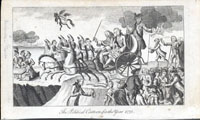The Conflict Begins

By the end of 1774, Lord North's ministry and the King were convinced that a vocal minority in the colonies was aiming for independence. On November 30, 1774, George III opened the new session of Parliament with a speech that one London merchant described to a correspondent in Virginia, "by which thou will see that Government are resolv'd to maintain their superiority over the Colonies." It was feared that Parliament must reassert its voice in the colonies-through force, if necessary-or risk the dissolution of the entire empire. But many Americans placed their hopes not in the King nor in the ministry, but in the new Parliament. As Josiah Quincy, Sr., in Massachusetts wrote to his son in London on January 3, 1775, "we are all, whether Whigs or Tories, quite solicitous to hear how the new Parliament opens," especially whether the recent election returned more "enemies to despotism, and friends to liberty" who were therefore "above corruption." Otherwise, "the enemies of the British Constitution in its purity are likely to succeed in their endeavours for its subversion."
The hopes of Quincy, and others like him in Britain and America, were soon dashed. In the first months of 1775, the new Parliament rejected conciliatory proposals from the Earl of Chatham and Edmund Burke and declared New England in a state of rebellion, all achieved by massive voting majorities. In the meantime, Lord Dartmouth, the Secretary of State for the Colonies, arranged for regiments to be sent to reinforce Lieutenant General Thomas Gage in Massachusetts as "the honour and safety of the empire require that in such a situation force should be repelled by force." Gage's subsequent attempt to secure gunpowder and ammunition from the potentially rebellious provincials resulted in the opening clash of arms at Lexington and Concord on April 19, 1775.







